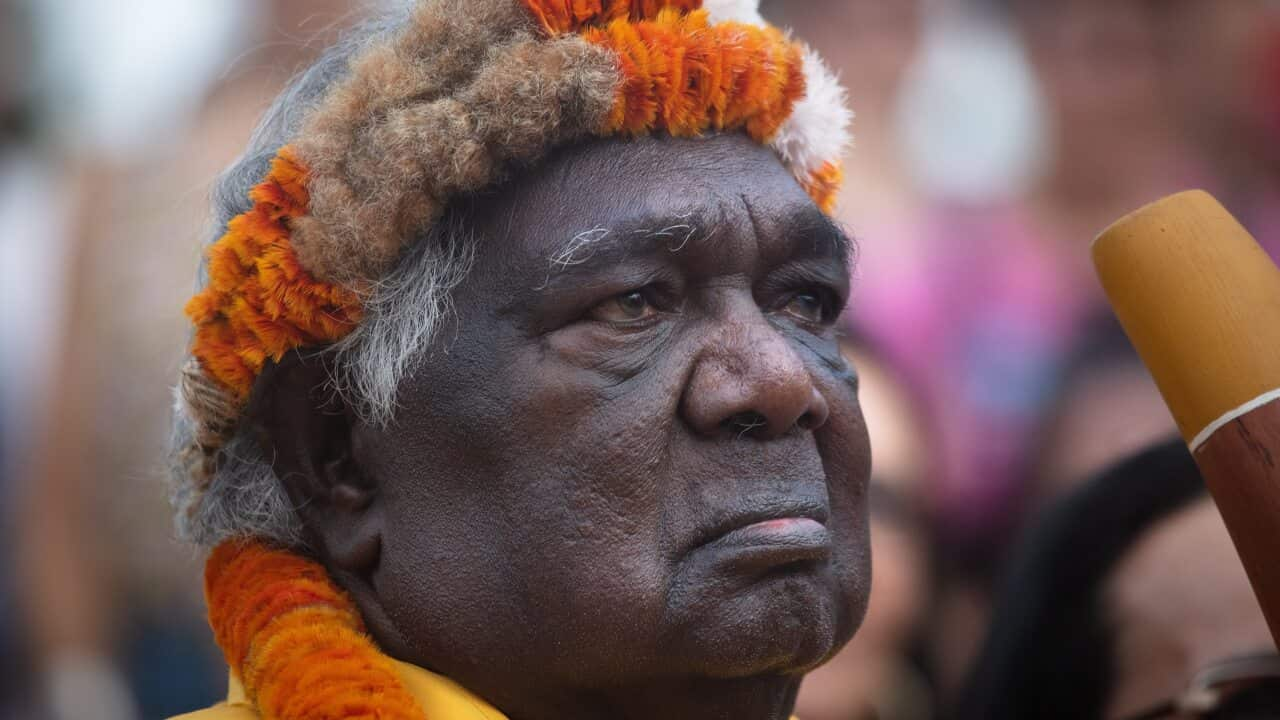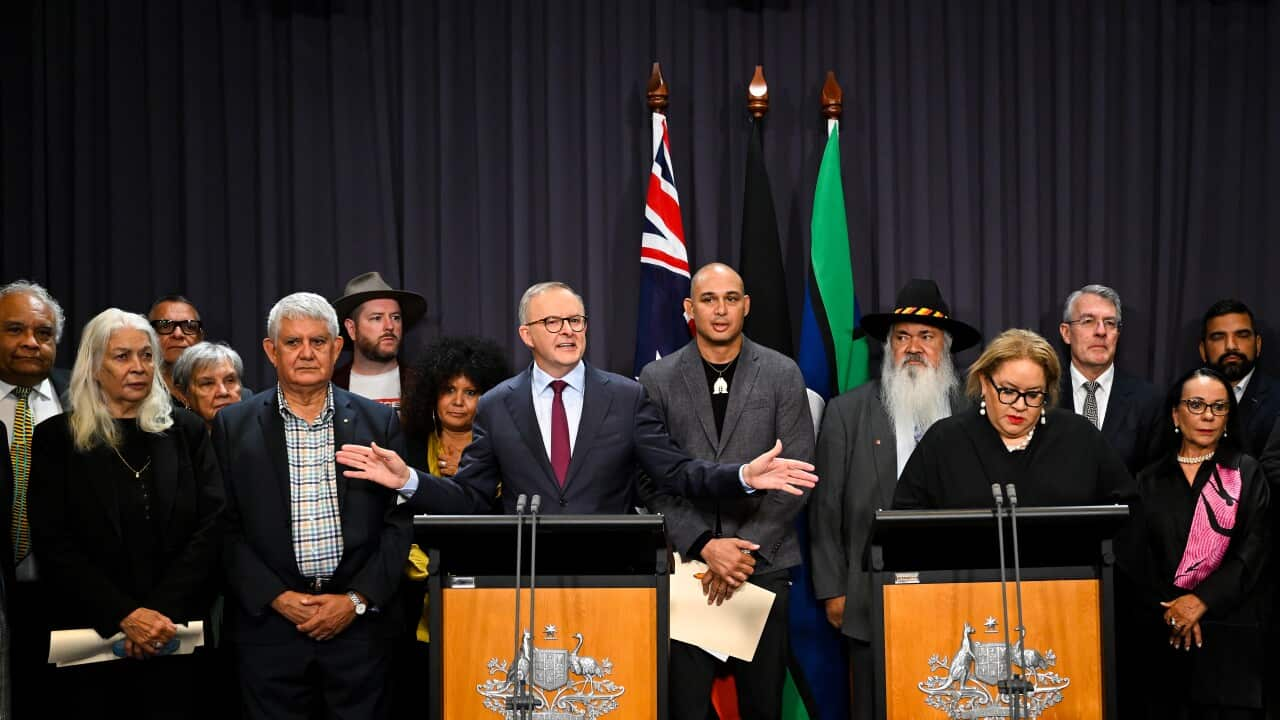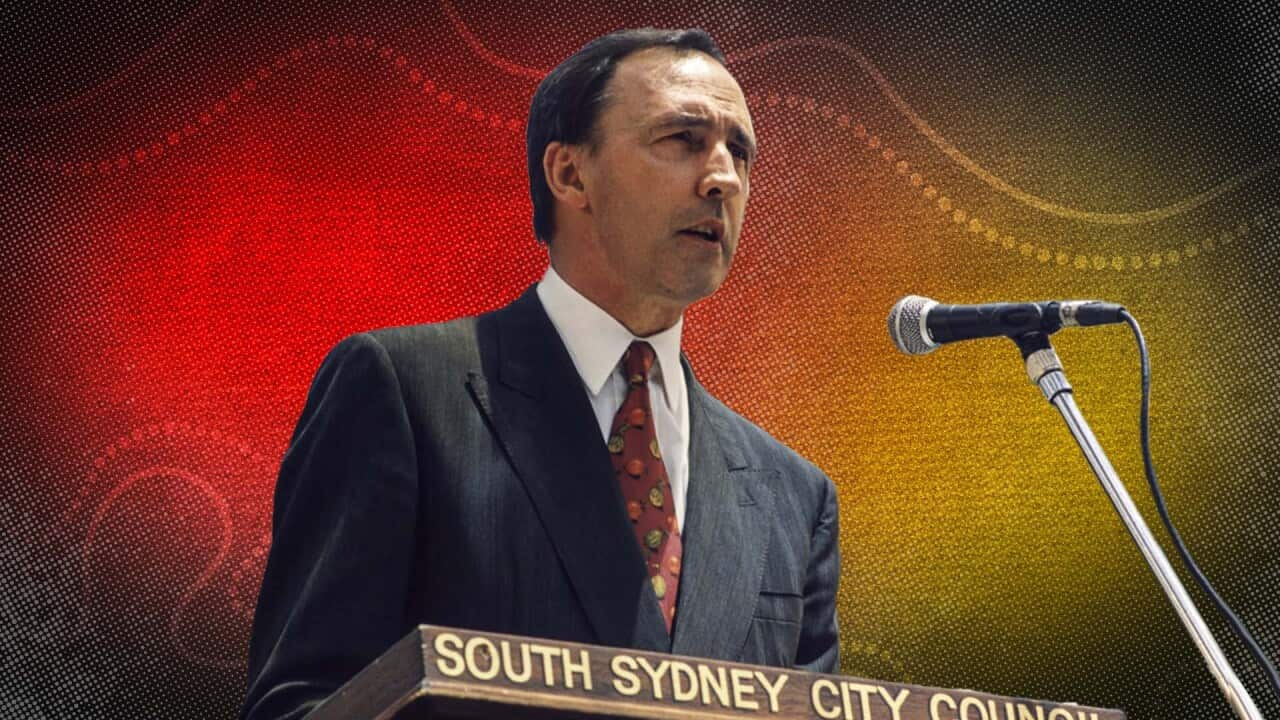Tributes are flowing for land rights pioneer Yunupingu, who died after a long battle with illness on Monday morning.
The 74-year-old was a revered Yolngu Elder and leader of the Gumatji clan, who dedicated his life to advancing land rights, his culture and improving the lives of his people.
Yunupingu's daughter Binmila Yunupingu issued a statement early this morning. She said while their family is hurting, they will honour him and "everything he has done".
"We remember him for his fierce leadership, and total strength for Yolngu and for Aboriginal people throughout Australia. He lived by our laws always," she wrote.
"Our father was driven by a vision for the future of this nation, his people’s place in the nation and the rightful place for Aboriginal people everywhere.

Yunupingu with daughter Binmila Yunupiŋu at Garma 2018. Credit: Melanie Faith - Yothu Yindi Foundation
"There will never be another like him."
Ms Yunupingu has requested that instead of flowers, those "who were touched" by her father's fire share "personal recollections and memories of his life".
"This will lift our spirits."
'An extraordinary, extraordinary leader'
Prime Minister Anthony Albanese was live on ABC radio when the news filtered through, lauding Yunupingu as “an extraordinary, extraordinary leader” who would be a “great loss”.
Mr Albanese said Yunupingu had “shown the way” to the generations of Indigenous leaders who came after him.
“He [was] an extraordinary leader of his people, and someone who was widely respected right across Indigenous and non-Indigenous Australia,” he said.

Yunupingu and prime minister Anthony Albanese sharing a moment at Garma Festival in 2022. Credit: Melanie Faith Dove - Yothu Yindi Foundation
“The spirit of Yunupingu is still with us,” he said.
But the prime minister appeared frustrated when asked whether Yunupingu would receive a state funeral.
“You've just given me the news. Have some respect,” he said.
“I will talk with the family because that is absolutely what is appropriate. I haven't even had the opportunity to talk to the family.”
Later in a formal statement, Mr Albanese described Yunupingu as "a great Australian".
“Yunupingu walked in two worlds with authority, power and grace, and he worked to make them whole - together,” he said.
“What he could see was not the reinvention of Australia, but the realisation of a greater one.”
Opposition Leader, Peter Dutton also shared his condolences, saying Yunupingu's influence was "omnipresent" in the community of Arnhem Land when he visited.
He noted that today is an opportunity to "acknowledge the life and legacy of not just a great Indigenous Australian, but one of our greatest Australians".
Reacting to the news on Monday, Indigenous Australians Minister Linda Burney said a “great sadness has settled on Australia”.
Ms Burney said she would dedicate a successful Voice campaign to Yunupingu.
“It is hard to put into words what this loss means for this country. It is hard to imagine the next Garma Festival, without Yunupingu. It is hard to imagine going forward for many people,” she said.
“But his legacy, his inspiration, will live on.”
The Minister also issued a statement alongside Senator Malarndirri McCarthy and Member for Lingiari Marion Scrymgour.
The women said the nation had "lost a giant".
Describing him as a "pioneer of the Aboriginal land rights movement", the trio believes his gift to the nation was "a life of truth-telling and a passionate belief in his people and in Australia".
Yunupingu was a member of the Referendum Working Group and the Indigenous co-design Advisory Group established by former minister Ken Wyatt.
"We as a nation can gift to him a successful referendum later this year," the women wrote.
"In his final months, Yunupingu reminded us: “the future is our responsibility”, and that we all have a responsibility to show leadership on: reconciliation, recognition, and the referendum."
Yunupingu worked alongside Indigenous academic Marcia Langton in progressing the referendum.
Speaking on ABC radio, the Professor said Yunupingu made friends “far and wide” because he “truly believed we are all one people”.
Professor Langton said, while most Australians knew Yunupingu as a ceremonial leader, he was also a “great clan leader and great family man”.
“If any Aboriginal culture survives today, and of course so much does, it is precisely because people like this great man valued culture above all else,” she said.
“Many people will be in mourning for him. [He] touched so many people with his gracious leadership and kindness.”

Professor Marcia Langton and Yunupingu at the Garma Festival in 2018. Credit: Melanie Faith Dove/ Yothu Yindi Foundation
"For just on half a century, he was a major spokesman for Indigenous interests and pursued those interests with rationality and consistency," he said.
"Much recognition for the interests of Indigenous people happened over the course of his active lifetime including, of course, the High Court decision in Mabo and the practical implementation of what the decision meant under the Native Title Act – the first really significant acts restoring justice in land for Indigenous peoples.
"Few would have been more conscious of the contemptuous disregard of Indigenous history, the dismal place that the First Peoples found themselves in, in their own Country."
Whilst Yunupingu lived to see a lot of progress, Mr Keating said he'd be "sorely missed".
United States Ambassador to Australia, Caroline Kennedy met Yunupingu whilst at Garma Festival in 2022 and says she was struck by the "tremendous respect and love" he drew from those around him.
"His leadership, service and sacrifice over decades helped Australia on its critical journey toward reconciliation," she said in a statement.
"Yunupingu spoke about himself as fire, one of his totems, which “must burn until there is nothing left.” In his inaugural address, my father President Kennedy talked about the light generated by defending freedom and that “the glow from that fire can truly light the world.”
"Yunupingu's fire illuminated us all. May it be a beacon of inspiration for generations to come."

Yunupingu and US Ambassador Caroline Kennedy met at Garma Festival in 2022. Credit: Melanie Faith Dove - Yothu Yindi Foundation
His passion for his people
Yunupingu played an immense role in many organisations, including establishing the Gumatj Corporation and being its inaugural chairman.
It was created as a pathway to achieve self-determination for his people through employment and business development.
"He believed that Yolngu people, like all of us, were economic beings. He saw welfare as poison for his people. His view was that welfare anchored his people to a future without independence and to a life controlled by government," said Chairman Djawa Yunupingu and CEO Klaus Helms.
"His drive, leadership and mentoring never wavering from this vision. Without our Chairman we would never have achieved the solid foundation we have built.
"He sought this future for his people, and he guided this company to its present state, building on the wealth of his people’s land, their knowledge of the land and their willingness to work for a future that is theirs."
The men agreed he would be dearly missed.
Yunupingu was the chair of the Northern Land Council (NLC) from 1977 to 1980 and again from 1983 to 2004 - he served eight terms over almost 25 years.
The new chair, Dr Samuel Bush-Blanasi, passed on the organisation's condolences to the "great leader, statesman and father".
“Yunupingu will always have a special place in the heart of the Northern Land Council. He served as Chair for almost half our existence. This year is our 50 anniversary. We are part of his great legacy,” Dr Bush-Blanasi said.

Yunupingu served eight terms at the NLC, across almost 25-years. Image Credit, Northern Land Council Source: Supplied / Northern Land Council
"Governments and everyone opposed us all the way. He took the fight to the streets, to Canberra and to the High Court many times. Lots of people today don’t remember what it was like. But we do and we will never forget,” he said.
The NLC has closed its doors out of respect for the passing of Yunupingu.
“It is true to say of Yunupingu that if we have seen far, it is because we have stood on the shoulders of this giant leader,” said NLC CEO Mr Martin-Jard.
READ MORE

The cultural significance of Garma
Between 1991 and 1996, Yunupingu was a member of the Council for Aboriginal Reconciliation, which later morphed into Reconciliation Australia.
The organisation said they've enjoyed a "warm and long-standing relationship" with the leader.
"With great patience and hope he argued throughout his life that respect for First Nations laws and cultures by mainstream Australian people and institutions would result in an improved country," said Reconciliation CEO Karen Mundine.
"Today is a sad day for the First Nations peoples of this continent and for all Australians."
Tributes will continue into the day, with information about a state funeral to come.













